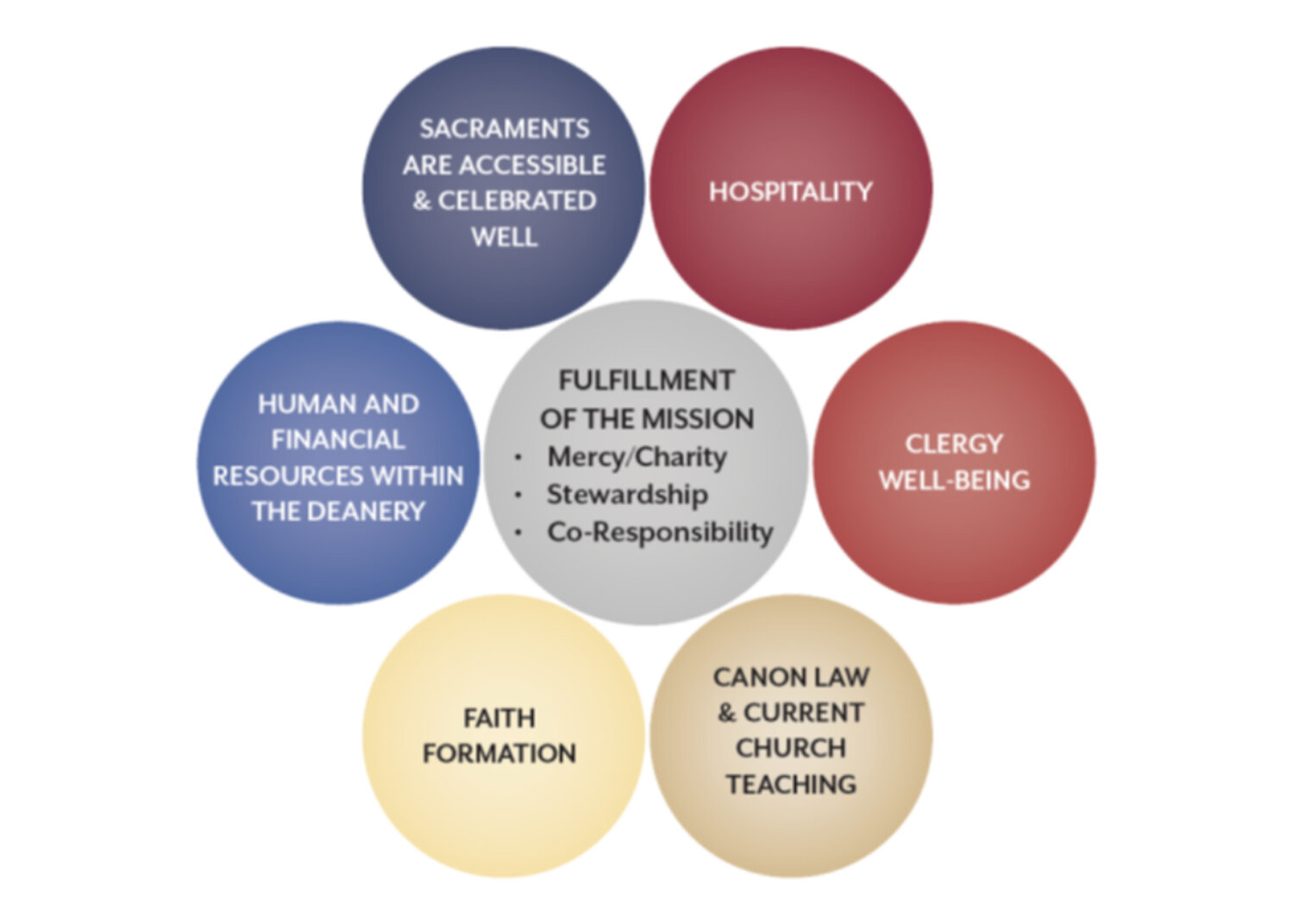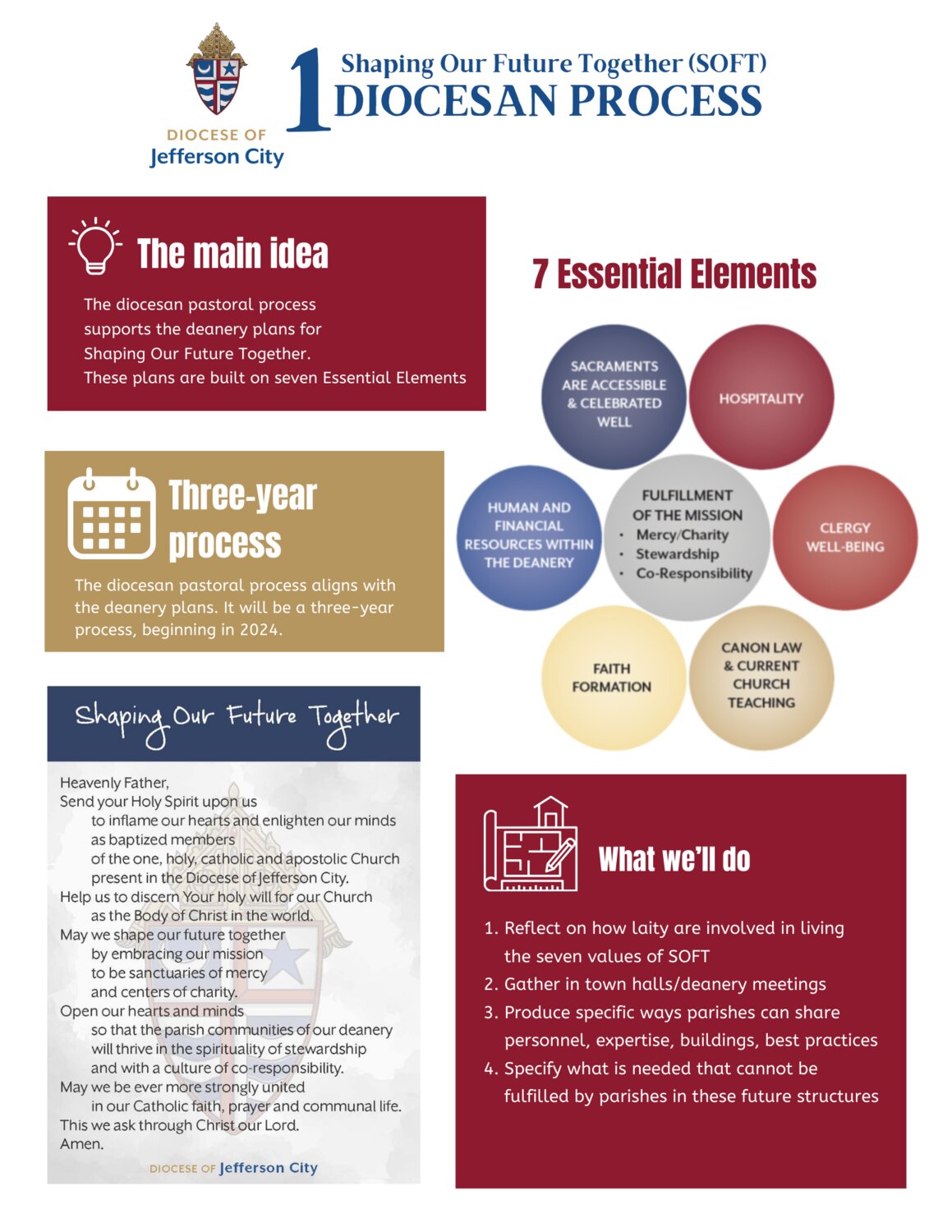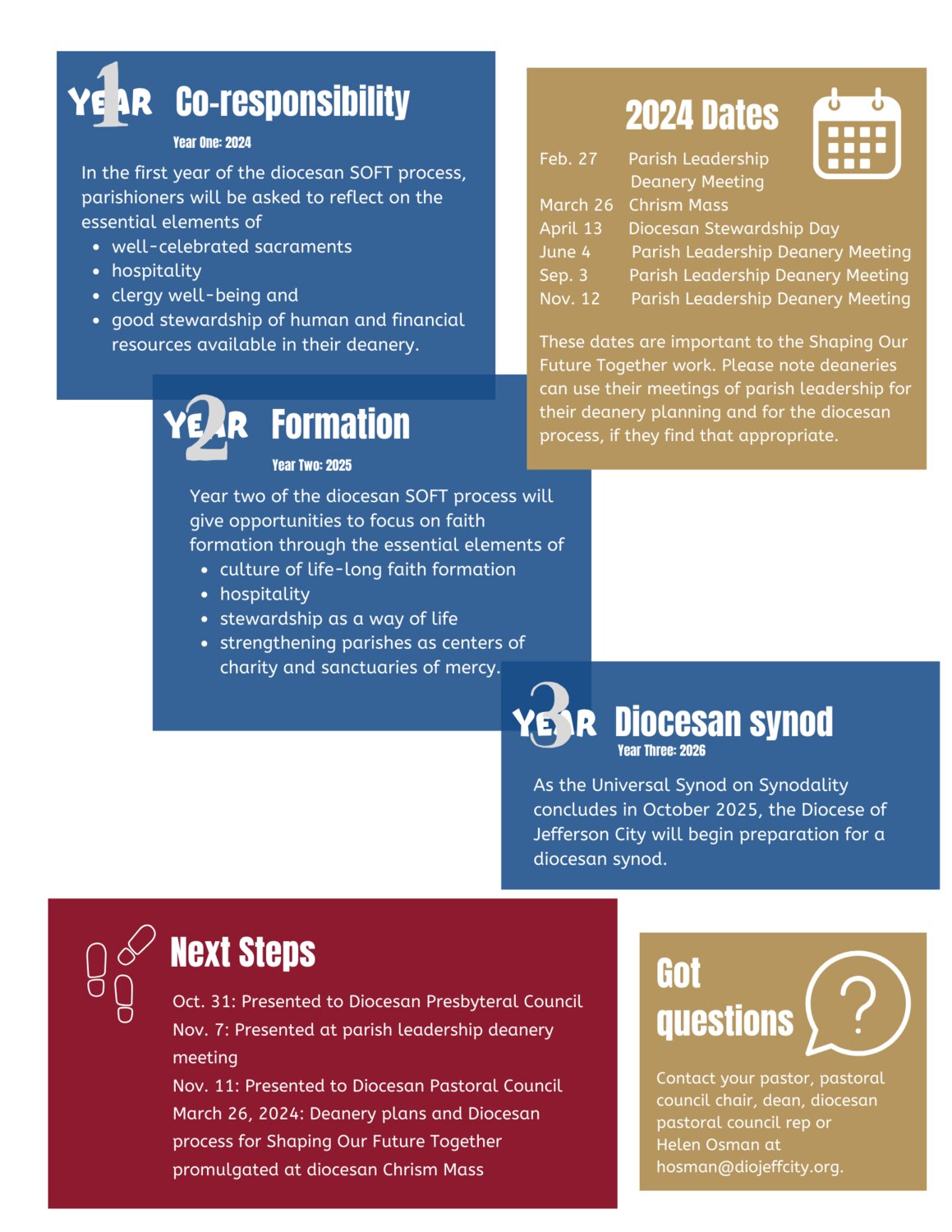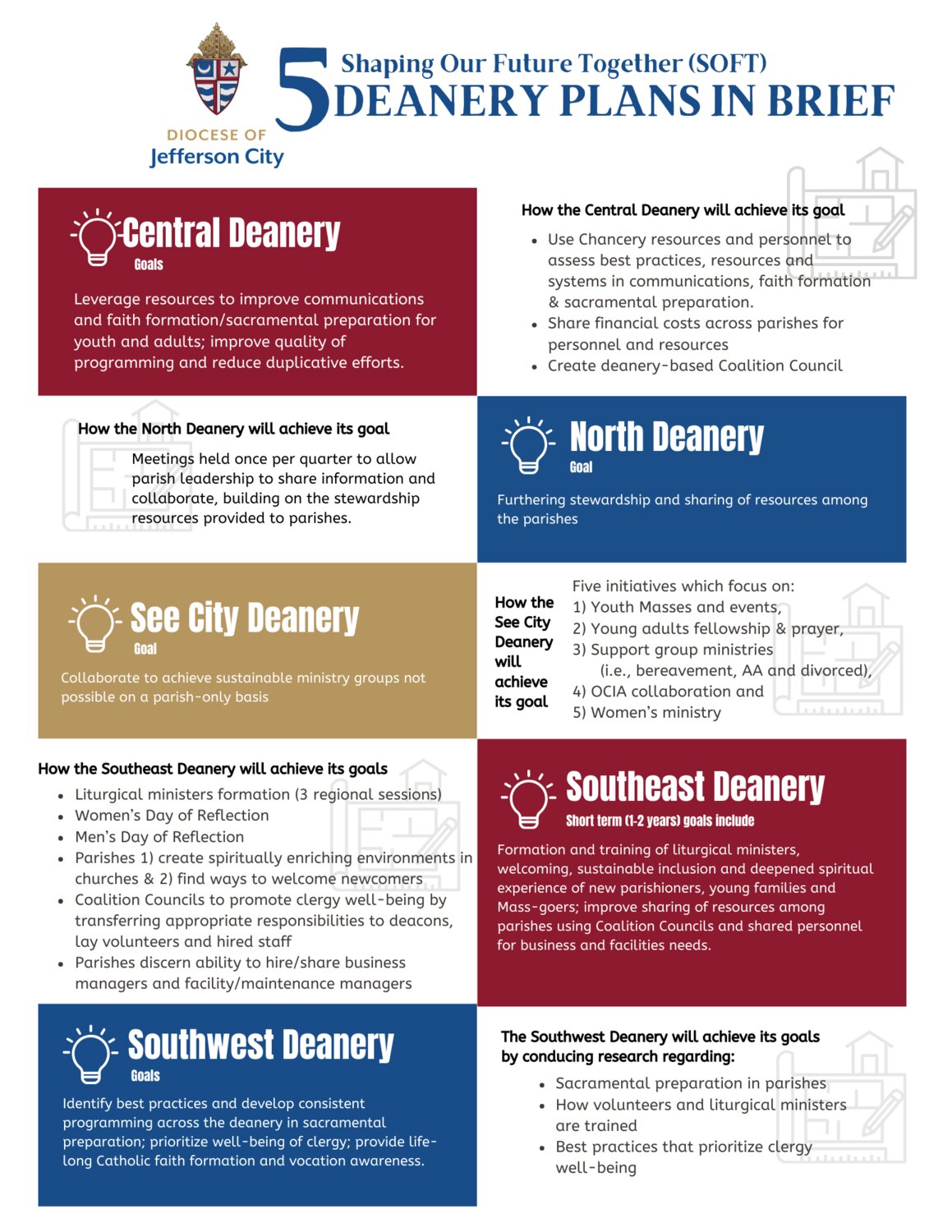In discerning, Shaping Our Future Together suggests more collaboration

Bishop McKnight offers seven values essential to the Church’s vision that must be used in pastoral planning:
The sacraments are accessible and celebrated well.
The parish is known for its hospitality and welcoming spirit.
•Priority is given to the well-being of our clergy and the need to prevent burnout among them. This includes recognizing priests are not allowed to celebrate more than two Masses on a weekday and three Masses on Sunday and holy days of obligation on a regular basis.
•Canon law and current Church teaching are embraced. There will be no “discerning” the changing of Church teaching to accommodate the lack of resources.
•Good faith formation is being provided for our children, youth and young adults, and families within a culture of lifelong formation for all adults.
•Good stewardship of the human and financial resources within the deanery is being practiced. We cannot expect people to perform professional services in the work of the Church without just compensation.
•The mission of our diocese is being fulfilled, as defined in our diocesan pastoral plan, by:
– promoting the engagement of all parishioners in the mission of the parish through a stewardship way of life;
– fostering a culture of co-responsibility, in which there is a mutual respect for the differing roles of the laity and clergy in the life and mission of the Church; and
– strengthening the parish’s capacity as a center of charity and sanctuary of mercy.
With God’s help, Catholics throughout the diocese are determining the future of the Church in which they live and raise their families.
They’re discerning how to build communities where divine worship, the sacraments, evangelization and service influence every aspect of their lives.
“We know what God wants for us — namely, the proclamation and fulfillment of the promise of eternal salvation,” said Bishop W. Shawn McKnight of the Shaping Our Future Together (SOFT) planning process. “How we will go about cooperating with that grace and maximizing its visibility in the world around us in this particular time in history is what we’re asking the Lord to reveal to us.”
He set the process in motion last October, with parish leaders meeting simultaneously in five locations, grouping themselves by deanery.
Each of the five deaneries — Central, North, See City, Southeast and Southwest — is led by a dean, who is a pastor in the deanery. Each deanery also has two representatives on the Diocesan Pastoral Council, a primarily lay group which serves as a consultative body to Bishop McKnight.
Through much of the past year, the deans, their deanery representatives and others from their deanery have been discussing and reflecting on how parishes can collaborate to grow and thrive.
They are using the mandate set by Bishop McKnight to create a deanery pastoral plan around seven essential values and “bold ideas and bold creativity” in addressing those seven values (see sidebar).
Acknowledging the uniqueness of each deanery, Bishop McKnight encouraged clergy and parishioners to discern together on how to establish a thriving future for the Church in their area, through a planning process “tailored to the needs of each individual deanery — a process that builds on the positive work already being done in our parishes,” Bishop McKnight stated.
Common themes
That discernment and consultation took place in meetings, town halls and surveys throughout the first half of 2023.
While each deanery applied a unique approach to addressing the seven values for pastoral planning, some common opportunities and challenges are emerging.
As reports and analysis are being made, several common ideas are emerging as ways for parishes to foster deeper collaboration. Suggestions being raised in more than one deanery include:
- Establishing “coalition” councils, which would meet regularly to share information and network;
- Setting standards for sacramental preparation and using teams of properly trained laypeople to provide sacrament preparation across parishes;
- Sharing paid personnel, whether in pastoral work (such as youth ministers or adult catechists) or in administrative work (such as bookkeeping, website upkeep and facilities management);
- Creating programs or other ways to bring together people across parishes. Examples include hosting a women’s conference or a men’s conference for a deanery, providing deanery-wide sessions for initiating new Catholics, and inviting the youth and their families in groupings within a deanery to a regular “youth Mass” at one parish; and
- Using digital communications to improve communication among parishioners in a coalition/grouping. Ideas include e-newsletters, shared bulletins and a common website for several parishes.
Time and distance
Parishes in four of the five deaneries used an online survey to poll parishioners.
The four unique surveys were conducted March through July, with 2,688 responses received overall.
Some, but not all, surveys had questions particular to Catholic schools, youth engagement, women’s ministry and how respondents served at their parishes.
Each survey considered the following questions in some manner:
- How far would people be willing to travel to participate in fully vibrant parish life?
- What are the challenges that keep people from being engaged more in parish activities?
- What are practical ways for laity and clergy to practice co-responsibility in the parish?
- What kind of adult faith formation would be of interest to parishioners?
Each survey also asked parishioners to evaluate their parish’s liturgical celebrations, service or charitable outreach, and approach to hospitality.
A review of survey responses reveals almost unanimity on one matter: very few people indicated they would drive more than 30 minutes for parish activities.
People appreciate the convenience of having a church near them, whether because of their busy schedules, their concerns about driving at night, or because they just don’t want to lose having a priest close by.
Across all four surveys, at least seven out of 10 respondents (and sometimes even more) said they prefer to drive less than 30 minutes to a Church activity.
The North Deanery, which has only 10% of the total number of Catholic households in the diocese, yet comprises one of the largest geographic areas of the diocese (with 12 counties) discussed the results of their survey at their Aug. 22 meeting.
Distance can be a challenge, the participants acknowledged, but they also noted that people can, and do, overcome distance. For instance, families with children will often travel extensively so their children can participate in sports and school activities.
Another person noted how their far-flung family works at finding ways to be together, both physically and online.
“We’re called to be intentional to make family” within the parishes, noted Monsignor Marion Makarewicz, who serves as dean and is pastor of Mary Immaculate Parish in Kirksville and the Mission of St. Rose of Lima in Novinger and sacramental minister for St. Mary Parish in Milan and the Mission of St. Mary in Unionville.
Toward greater unity
The North Deanery members also gently challenged each other on what they, as lay people, do to encourage unity and support across parishes. For instance, one participant asked those present how often they attend a funeral Mass at their parish, even if they don’t know the person being buried.
Implicit in the conversation was the realization that the priest cannot be the only connection between the parish and those who are grieving; lay parishioners can also accompany people in their time of spiritual need.
That realization of how lay people can further the ministries and witness of the Church has been happening in the Central Deanery, too, according to Kelly Wheeler, a member of Our Lady of Lourdes Parish in Columbia and one of the Central Deanery’s representatives on the Diocesan Pastoral Council.
“I am seeing an awakening,” Wheeler said in describing the progression. “People are realizing: ‘I am a lay person and I see where I can have some control in this situation.’
“People are beginning to understand, ‘If we can work together, we can really get a lot accomplished,’” she noted. “At the most recent meeting, for the first time I heard people say, ‘This is exciting. We can think outside the box now — we can work with other parishes.’”
That concept of “better together” is core to what is coming to the surface in the See City Deanery discussions, too, according to Deacon John Schwartze, also a representative on the Diocesan Pastoral Council and who assists the pastor of Cathedral of St. Joseph Parish in Jefferson City.
“Until now, our efforts and programming have been largely parish-focused,” Deacon Schwartze explained. “The result is we often don’t leverage a successful program at a particular parish to the benefit of other parishes.”
The See City Deanery has discerned “This is particularly true in the efforts to reach youth and young adults,” he explained.
The See City Deanery’s planning is focusing on cooperation, he said, “so we build on each other’s strengths; and it is not just seeking to leverage ‘what is,’ but it is also to come together to plan new initiatives on what ‘can be.’”
One such initiative that is being considered is marshalling the talents and gifts of youth for a Sunday Mass at a parish in Jefferson City, and extending the invitation beyond just that parish.
Deacon Schwartze pointed to an additional benefit when a program expands beyond the confines of a parish: Catholics become better witnesses of the faith to the larger community.
“The Church doesn’t become just another building they drive by,” he said.
Instead, he believes becoming more inviting to “non-parishioners” will also be seen as more inviting to all. “It is important for us to look outward that we reach those who have left the Church and to be a conduit to help them find their way back.”
By inviting people into an event or Mass at another parish, “We’re just doing what the Gospel tells us, announcing that the Kingdom of God is at hand,“ he said.
Lifting each other up
A lack of welcoming or invitation was also revealed in the survey responses. A significant minority (about one of every six) survey responders indicated they haven’t been asked to help or that they are excluded from some volunteer opportunities because of others “who have always done it a certain way” or “cliques.”
Some deaneries, including the Southwest Deanery, recognize that parishes can be more welcoming and increase engagement by giving volunteers adequate training and formation.
Sometimes, volunteer catechists and liturgical ministers are criticized for their misinterpretation of Church teachings or mistakes they make. People are reluctant to volunteer because they aren’t confident in their own “faith knowledge” or are concerned they’ll be chastised by other parishioners.
The Southwest Deanery intends to research how parishes are preparing people for all seven sacraments, how catechists and lead lay ministers are being trained, and then to offer parishes best practices so that the sacraments are accessible and well-celebrated.
Other deaneries are also considering how to improve lay faith formation.
Another way to invite more people into parish life could be by expanding opportunities for faith-sharing outside of the Sunday Mass or other worship/prayer experiences.
Survey respondents are favorable to more adult faith formation opportunities. Almost universally, they prioritized opportunities to share in their faith, whether that was by Bible studies, small group faith-sharing programs or through a speakers’ series or presentations.
Only one group of parishioners prioritized the creation of Rosary/prayer groups over other kinds of adult programming.
Out in the open
While surveys have served as one way to gather information and perspectives, several deaneries have used town halls, or an open gathering of all Catholics, to discern how parishes can share and reinvigorate.
When people attending town hall meetings realize that the planning process is not about closing parishes, everything shifts, explained Sheri Stormer, a Diocesan Pastoral Council representative for the Southeast Deanery and a member of Visitation Parish in Vienna.
Instead, parishioners have been able to explore and share ways to deepen the experience of worship, starting with people stepping into the church and settling in before Mass, to considering the benefit of parishes sharing professionals as facility managers.
The discussions have indicated that these professionals could ensure proper maintenance is being done on the buildings that are historic and spiritual treasures of small towns.
The Southeast Deanery is also proposing the creation of councils for coalition of parishes. These coalition councils could serve as an important part of the feedback loop for town hall meetings and parish leadership, allowing representatives from each parish council in the coalition to share information and increase ways to collaborate.
Work in progress
The planning process continues, with two deaneries having submitted plans to Bishop McKnight for evaluation, and the other three deaneries on schedule.
Implementation of the deanery pastoral plans is expected to begin this Advent.
Comments
Other items that may interest you
Services
The Catholic
Missourian
2207 W. Main St.
Jefferson City MO 65109-0914
(573) 635-9127
editor@diojeffcity.org









